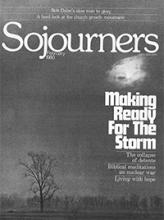Jesus stood before the congregation in Nazareth, Luke tells us, and read the text from Isaiah which begins, "The spirit of the Lord is upon me, because the Lord has anointed me to preach good news to the poor."
Those present knew a great deal about bad news and about poverty. The news to which they were accustomed was news of hunger, of the abusive activities of occupation soldiers and the immense problems of being tenant farmers subject to absentee landlords and their local agents; news of the growing burden of taxes which paid the cost of their own subjection, of fresh acts of collaboration by religious and political leaders with the Romans, of beatings and executions. Jesus' hearers were people systematically humiliated. Many must have painfully felt the silence and even absence of God, and sensed the abandonment of creation, the abandonment of God's own faithful people, to the power of death.
The context in which the good news was announced was a situation of despair. Jews could readily experience their lives as being in the end time. Jesus, in his teaching, did not challenge that sensibility but rather taught how to live in an end time, how to become faithful in an end time.
We also live in an end time. The Utopian expectations celebrated at the twentieth century's beginning seem to us far more distant and unimaginable than pharaohs and sphinxes. The century became a habitat of nightmares, a time of despair.
Some of the words and phrases that reveal the reasons for the widespread sense of dread include:
World War I, World War II, Verdun, the Holocaust, Pearl Harbor, the Siege of Leningrad, Hitler, Stalin, Auschwitz, Babi Yar, Dresden, Hiroshima, Nagasaki, and the Berlin Wall; tiger cages, My Lai, the Christmas Bombing, and the Plain of Jars; the SS-20, the cruise missile, the MX, the Minuteman II, the neutron bomb, and the Trident submarine; thalidomide, cancer, and plutonium.
Read the Full Article

